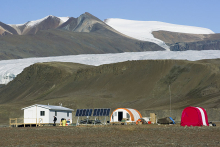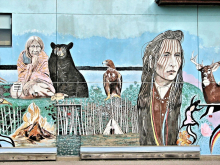Photo: Anaïs Remili (centre), winner of the Prize for Graduate Students and Postdoctoral Fellows, with Valérie Orsat, Acting Dean, Faculty of Agricultural and Environmental Sciences, and McGill President, Deep Saini


In The Conversation, Department of Natural Resource Sciences PhD Candidate Elson Ian Nyl Galang and Dalhousie University Postdoc Lara Cornejo write about their experience gathering a group of leading thinkers in Halifax, near the iconic Bay of Fundy, to set about imagining “what could plausibly happen to the Bay of Fundy coast by 2072.”

On March 21, McGill celebrated 111 laureates at the 19th edition of Bravo, a gala event honouring researchers who won major provincial, national, and international research prizes and awards in 2023. Guests, including researchers, their families and friends, faculty, students, and members of McGill’s academic administration, gathered to celebrate their accomplishments.
Eight of the honourees were from the Faculty of Agricultural and Environmental Sciences:
The Palais des congrès de Montréal honoured five McGill professors at its 2024 ambassadors’ gala for their exceptional contributions to the city’s economic and societal growth. Although there are a few other professors among the total of 14, McGill alone can boast of multiple honourees.
The basis for earning the kudos is the ability to organize large-scale events in Montreal.

It’s possible animals — pets and wildlife alike — will behave unusually during Quebec’s total solar eclipse on April 8 , according to experts on their behaviour.
David Bird, emeritus professor of wildlife biology at McGill University, told the Montreal Gazette that birds, insects and bats are the main groups expected to be affected, or “the main ones that everybody’s sort of keeping an eye on.”

White-tailed tropicbirds spend most of the year at sea, out of sight of people. When the seabirds make their annual descent into Bermuda to breed, though, their long, streamer-like tails, snowy white plumage, and shrill calls are impossible to miss. To locals, the birds’ return to the islands is a reliable sign of spring.

In a new article for the McGill Reporter, Department of Natural Resource Sciences PhD Candidate Elson Ian Nyl Galang argues that to restore Quebec’s landscapes for sustainability and resilience, we need to carefully think about which pathways of development and decision-making we prioritize.
This Sunday, February 11, marks the United Nation’s International Day of Women and Girls in Science, which promotes full and equal access to science for women and girls.
According to the UN, a significant gender gap persists at all levels of science, technology, engineering, and mathematics (STEM) disciplines all over the world. Even though women have made tremendous progress towards increasing their participation in higher education, most countries, no matter their level of development, have not achieved gender equality in STEM.

Growing up in Minnesota, McGill PhD student Scott Sugden spent a lot of time outdoors, particularly canoeing and backpacking in the Arctic.
The Arctic became a landscape that he cared deeply about. It led to work in outdoor education, a high school biology classroom, and now as a researcher in environmental microbiology.

On Wednesday November 29th, 2023, nine Macdonald Campus graduate students took on the challenge of presenting their thesis in just a few minutes at the Lister Family Engaged Science 3-Minute Thesis Competition.
With only one non-animated slide for visual support, competitors raced against the clock to explain the crucial components of their research and its importance.

Ărramăt Project: harnessing Indigenous wisdom for biodiversity conservation and community well-being
Imagine living in a world where the wisdom of Indigenous communities guides our actions towards biodiversity and human health. This isn't just a vision; it's becoming a reality through the groundbreaking initiative known as Ărramăt. This New Frontiers in Research funded project is a pioneering effort to acknowledge and amplify the voices of Indigenous peoples, empowering them to share their knowledge about the environment's role in promoting health and well-being.

As the Arctic wind whistles through Canada's northern wilderness, a unique collaboration is unfolding between scientists and Indigenous communities. Graduate and Postdoctoral students in the Northern Research Knowledges Lab, under the leadership of Dr. Murray Humphries, are redefining how scientific research is conducted.

In our busy everyday lives, it's easy to overlook our deep-rooted connection with nature. The connection is not just about the nourishment we derive or the air we breathe; nature subtly but significantly enhances our well-being. This intriguing intersection is where McGill Department of Natural Resource Sciences PhD candidate Jackie Hamilton directs her research.

Dr. Murray Humphries (PhD’01), a passionate wildlife biology professor at the Macdonald Campus, spends his days immersed in the fascinating world of biodiversity—the colorful, complex tapestry of life on Earth. At the Macdonald Campus, we don't just study this diversity, we celebrate it.

The tidal wetlands and dykelands of the inner Bay of Fundy are critical ecosystems in Nova Scotia and New Brunswick, providing essential benefits to human and non-human communities.
These ecosystems offer biodiverse habitats, protection from coastal flooding, and cultural value for Indigenous, Acadian, and other communities. However, they are increasingly threatened by climate change, making their management more complex and their future uncertain.
